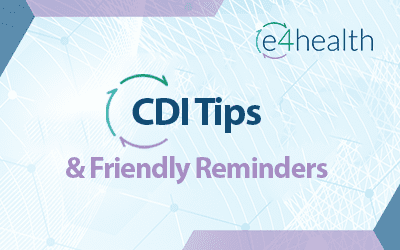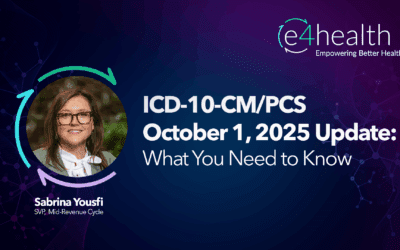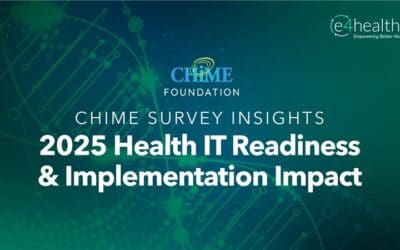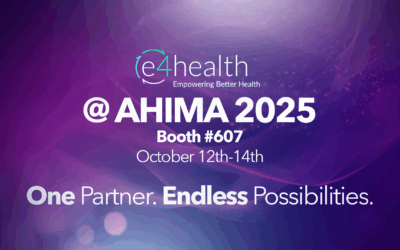News & Blog
Gain industry insights and stay up to date on company updates from e4health
October Coding Coven Recap: Wicked Tips & Tricks for Profee Coders & Auditors
Oct 30, 2025
Thank you to everyone who joined our October Coding Coven—a lively hour of profee coding insights, practical scenarios, and auditor-ready documentation tips. Below is a tight recap of key ideas to help you apply what you learned without giving away the full spell book. 🧙♀️
🎙️ CIO Report: Clinical Data Migration Challenges & Best Practice Advice
Oct 28, 2025
What happens when legacy data meets new tech?
Our own Darin Ryder, SVP of Sales at e4health, joined Beth Friedman live at the HIMSS Georgia Chapter Annual Conference to talk about one of the biggest challenges CIOs face today — clinical data migration and retention during new EHR implementations.
Coding Tips: Viral Myocarditis due to COVID-19 (1Q 2025 Coding Clinic)
Oct 28, 2025
Viral Myocarditis due to COVID-19 (1Q 2025 Coding Clinic) There was a revision made to the ICD-10-CM Alphabetic Index, effective April 1, 2025 per the Centers for Disease Control and Prevention’s (CDC) National Center for Health Statistics (NCHS) during a recent...
Coding Tips: Zero Balance Ultrafiltration/Z-BUF (1Q 2025 Coding Clinic)
Oct 20, 2025
Zero Balance Ultrafiltration/Z-BUF (1Q 2025 Coding Clinic)Ultrafiltration is used to maintain volume management and/or filter the blood in order to reduce the adverse effects of hemodilution during cardiopulmonary bypass (CPB). Hyperkalemia is common while on CPB and...
Exploring IT Optimization Opportunities in the Mid-Revenue Cycle [On-Demand Webinar]
Oct 16, 2025
CDI Tips: Adult Obesity
Oct 15, 2025
Adult Obesity Definition Obesity: Recognized as a BMI > 30. Morbid obesity: BMI > 40 or > 35 with at least one obesity related comorbid condition such as diabetes, heart disease, stroke, hypertension or arthritis. Drug-induced obesity (iatrogenic obesity):...
Coding Tips: Hepatorenal Syndrome with Acute Kidney Injury (1Q 2025 Coding Clinic)
Oct 13, 2025
Hepatorenal Syndrome with Acute Kidney Injury (1Q 2025 Coding Clinic)A patient presents with acute kidney injury (AKI) likely secondary to hepatorenal syndrome (HRS) secondary to metastatic breast cancer to the liver. Would AKI and HRS be reported separately or is AKI...
ICD-10-CM/PCS October 1, 2025 Update: What You Need to Know
Oct 8, 2025
This executive brief takes a closer look at the use of utilizing audit data to drive awareness, education, and operational improvements.
Coding Tips: Jaundice and Premature Newborn (1Q 2025 Coding Clinic)
Oct 7, 2025
Jaundice and Premature Newborn (1Q 2025 Coding Clinic)Is it appropriate to assign code P59.0, Neonatal jaundice associated with preterm delivery, based on the newborn’s prematurity or must the provider document that the jaundice is due to the preterm delivery? The...
Coding Tips: Breech Presentation with No Current Issues (1Q 2025 Coding Clinic)
Sep 30, 2025
Breech Presentation with No Current Issues (1Q 2025 Coding Clinic)Is it appropriate to report a code for breech presentation for the newborn since he/she was not affected by the breech delivery? A newborn is delivered via C-section due to breech presentation. The...
2025 Health IT Readiness & Implementation Impact — CHIME Survey Insights
Sep 30, 2025
e4health at AHIMA25
Sep 24, 2025


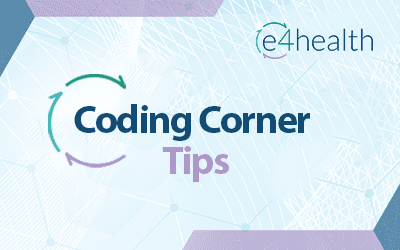
![Exploring IT Optimization Opportunities in the Mid-Revenue Cycle [On-Demand Webinar]](https://www.e4.health/wp-content/uploads/2025/10/Nick-webinar-2025-400x250.png)
